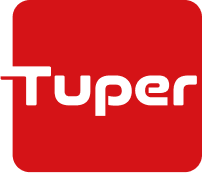We can define clean energy as that which is produced from renewable sources, available in greater or lesser abundance in nature. Unlike energy derived from polluting sources, this type of energy does not release harmful gases into the atmosphere, and its production has little impact on ecosystems.
Clean energy sources are essential for diversifying the energy matrix, reducing the risk of supply shortages, and are the most recommended option for sustainability. The reasoning is simple: the more dependent on a single resource, such as fossil fuels, the greater the chances of suffering from a lack or rationing of energy, necessitating the use of other options for electricity generation. Therefore, when we refer to clean energy, we are actually considering that the sources that produce this energy are “clean,” derived from renewable resources such as wind, hydro, geothermal, and solar.
Consumption choices make a difference
For a company like Tuper, the topic of energy is of great importance. In addition to encouraging research and production of clean energy sources through direct acquisition, managing this acquisition and energy distribution in the industry is crucial to measure and understand how the production chain may be affected. At Tuper, there is a department responsible for energy procurement and management – the energy management department, linked to the automation area.
According to Renan Carlo Piccinini, an energy management analyst, Tuper is classified as a free consumer, which means it can purchase energy directly from the market. Since 2010, the company has acquired the majority of its load from renewable sources – wind, solar, small hydroelectric plants (SHP), and the projection for the coming years is that this percentage will be 100%.
Procurement can be done directly from the supplier or via a trading company. Regarding the regulatory model of the electricity sector, Tuper falls into the category of companies that can choose whether or not to contract incentivized energy, but it opts for the acquisition of 50% incentivized energy, which is classified as clean energy.
Automation is the key to management
Considering technical analysis, Renan emphasizes the importance of having an internal automated control system, developed by the company’s own professionals, which allows for efficient management of all data related to energy consumption and distribution in industrial plants. The company maintains supervisory systems at all load entrances, and in newer units, such as Tuper Oil and Gas, there is measurement by the feed panel, and 24-hour monitoring of all loads in all plants is carried out.
The system also allows load control, and if, for example, a certain power limit of the distributor is exceeded, the equipment in the unit is automatically shut down. Based on the collected data, detailed measurement reports of all points can be obtained, and automatic power factor control is carried out in practically all panels, which results in a high level of automation. All forming and welding units have monitored power, enabling various forms of control, reading, and data collection.
Renan emphasizes the importance of energy management in the company to facilitate the understanding of processes that would possibly be different if the function were performed by third parties. “We are directly linked to any changes that may occur in the production lines, for example, and we can better manage the impact of external factors such as the risk of energy rationing that the country has been facing in 2021, potential price increases, or regulatory actions. Based on the data collected, it is possible to take the necessary measures to ensure that energy supply for production remains stable,” says the analyst. The consequences of careful management are savings and the promotion of clean energy consumption as a way to reduce environmental impact and support sustainable practices. “Tuper could choose to consume only part of the energy from clean sources, but it has chosen to use 100% of the consumption from these sources,” he concludes.
Understanding the difference between the captive and free energy markets
In Brazil, we currently have two types of electricity consumers: free and captive. The free consumer purchases energy directly from generators or traders through bilateral contracts with freely negotiated conditions, such as price, term, volume, etc. Each consumer unit pays a bill for the distribution service to the local utility (regulated tariff) and one or more bills for the purchase of energy (negotiated contract price).
The captive consumer is one who buys energy from the distribution companies to which they are connected. Each consumer unit pays only one monthly energy bill, including distribution and energy generation services, and the rates are regulated by the government.
To learn more about energy sources:
http://www.ons.org.br/
https://www.ccee.org.br/
https://www.aneel.gov.br/
https://www.epe.gov.br/pt
Learn about Tuper’s Sustainability initiatives.
About Tuper
Tuper is one of the largest steel processors in Latin America. With over 50 years of history, the company operates with one of the most advanced technological setups for steel tube formation. It has eight business units across three industrial plants and a processing capacity of 826,000 tons of steel per year. In addition to serving the original automotive sector, Tuper also operates in the fields of exhaust systems and catalytic converters (for the aftermarket), industry, oil and gas, construction, and agribusiness.
The extensive product portfolio includes black and galvanized carbon steel tubes for industrial, structural, and conduit applications, drawn tubes, tubes for heat exchange, API tubes for the oil and gas market, galvanized conduits, tubular piles for quick foundations, structural metal profiles, automotive parts and components, original equipment manufacturer (OEM) exhaust systems, automotive aftermarket exhausts, metal roofing systems, ribbed composite slabs, scaffolding, props, paneling, and slitters for use in the construction sector.
Learn more about Tuper.


















